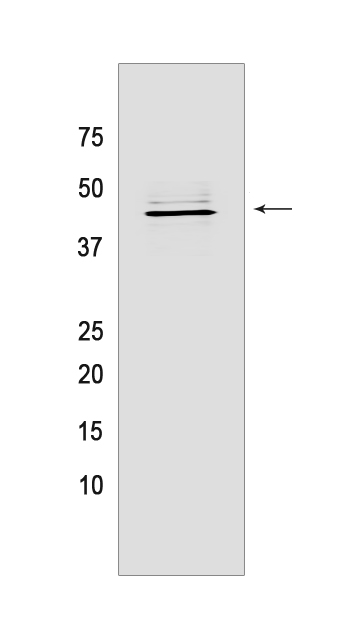HLA-G Mouse mAb[263S]Cat NO.: A13833
Western blot(SDS PAGE) analysis of extracts from human placenta tissue.Using HLA-G Mouse mAb IgG [263S] at dilution of 1:1000 incubated at 4℃ over night.
Product information
Protein names :HLA-G,HLA-6.0,HLAG,HLAG_HUMAN,HLA class I histocompatibility antigen, alpha chain G [Cleaved into: Soluble HLA class I histocompatibility antigen, alpha chain G ]
UniProtID :P17693
MASS(da) :38,224
MW(kDa) :45kda
Form :Liquid
Purification :Protein A purification
Host :Mouse
Isotype :IgG
sensitivity :Endogenous
Reactivity :Human
- ApplicationDilution
- 免疫印迹(WB)1:1000-2000
- 免疫组化(IHC)1:100
- The optimal dilutions should be determined by the end user
Specificity :Antibody is produced by immunizing animals with a synthetic peptide of human HLA-G.
Storage :Antibody store in 10 mM PBS, 0.5mg/ml BSA, 50% glycerol. Shipped at 4°C. Store at-20°C or -80°C. Products are valid for one natural year of receipt.Avoid repeated freeze / thaw cycles.
WB Positive detected :human placenta tissue
Function : [Isoform 1]: Non-classical major histocompatibility class Ib molecule involved in immune regulatory processes at the maternal-fetal interface (PubMed:23184984, PubMed:29262349, PubMed:19304799). In complex with B2M/beta-2 microglobulin binds a limited repertoire of nonamer self-peptides derived from intracellular proteins including histones and ribosomal proteins (PubMed:7584149, PubMed:8805247). Peptide-bound HLA-G-B2M complex acts as a ligand for inhibitory/activating KIR2DL4, LILRB1 and LILRB2 receptors on uterine immune cells to promote fetal development while maintaining maternal-fetal tolerance (PubMed:23184984, PubMed:29262349, PubMed:16366734, PubMed:19304799, PubMed:20448110, PubMed:27859042). Upon interaction with KIR2DL4 and LILRB1 receptors on decidual NK cells, it triggers NK cell senescence-associated secretory phenotype as a molecular switch to promote vascular remodeling and fetal growth in early pregnancy (PubMed:23184984, PubMed:29262349, PubMed:16366734, PubMed:19304799). Through interaction with KIR2DL4 receptor on decidual macrophages induces pro-inflammatory cytokine production mainly associated with tissue remodeling (PubMed:19304799). Through interaction with LILRB2 receptor triggers differentiation of type 1 regulatory T cells and myeloid-derived suppressor cells, both of which actively maintain maternal-fetal tolerance (PubMed:20448110, PubMed:27859042). May play a role in balancing tolerance and antiviral-immunity at maternal-fetal interface by keeping in check the effector functions of NK, CD8+ T cells and B cells (PubMed:10190900, PubMed:11290782, PubMed:24453251). Reprograms B cells toward an immune suppressive phenotype via LILRB1 (PubMed:24453251). May induce immune activation/suppression via intercellular membrane transfer (trogocytosis), likely enabling interaction with KIR2DL4, which resides mostly in endosomes (PubMed:20179272, PubMed:26460007). Through interaction with the inhibitory receptor CD160 on endothelial cells may control angiogenesis in immune privileged sites (PubMed:16809620).., [Isoform 2]: Likely does not bind B2M and presents peptides. Negatively regulates NK cell- and CD8+ T cell-mediated cytotoxicity (PubMed:11290782).., [Isoform 3]: Likely does not bind B2M and presents peptides. Negatively regulates NK cell- and CD8+ T cell-mediated cytotoxicity (PubMed:11290782).., [Isoform 4]: Likely does not bind B2M and presents peptides. Negatively regulates NK cell- and CD8+ T cell-mediated cytotoxicity (PubMed:11290782).., [Isoform 5]: Non-classical major histocompatibility class Ib molecule involved in immune regulatory processes at the maternal-fetal interface (PubMed:23184984, PubMed:29262349, PubMed:19304799). In complex with B2M/beta-2 microglobulin binds a limited repertoire of nonamer self-peptides derived from intracellular proteins including histones and ribosomal proteins (PubMed:7584149, PubMed:8805247). Peptide-bound HLA-G-B2M complex acts as a ligand for inhibitory/activating KIR2DL4, LILRB1 and LILRB2 receptors on uterine immune cells to promote fetal development while maintaining maternal-fetal tolerance (PubMed:23184984, PubMed:29262349, PubMed:16366734, PubMed:19304799, PubMed:20448110). Upon interaction with KIR2DL4 and LILRB1 receptors on decidual NK cells, it triggers NK cell senescence-associated secretory phenotype as a molecular switch to promote vascular remodeling and fetal growth in early pregnancy (PubMed:23184984, PubMed:29262349, PubMed:16366734, PubMed:19304799). Through interaction with KIR2DL4 receptor on decidual macrophages induces pro-inflammatory cytokine production mainly associated with tissue remodeling (PubMed:19304799). Through interaction with LILRB2 receptor triggers differentiation of type 1 regulatory T cells and myeloid-derived suppressor cells, both of which actively maintain maternal-fetal tolerance (PubMed:20448110). Reprograms B cells toward an immune suppressive phenotype via LILRB1 (PubMed:24453251).., [Isoform 6]: Likely does not bind B2M and presents peptides.., [Isoform 7]: Likely does not bind B2M and presents peptides..
Tissue specificity :Expressed in adult eye (PubMed:1570318). Expressed in immune cell subsets including monocytes, myeloid and plasmacytoid dendritic cells and regulatory T cells (Tr1)(at protein level) (PubMed:20448110). Secreted by follicular dendritic cell and follicular helper T cells (PubMed:24453251). Isoform 5: Detected in physiological fluids including amniotic fluid and serum (PubMed:11137219). Isoform 7: Expressed in placenta, amniotic membrane, skin cord blood and peripheral blood mononuclear cells (PubMed:11137219)..
Subcellular locationi :[Isoform 1]: Cell membrane,Single-pass type I membrane protein. Endoplasmic reticulum membrane. Early endosome membrane.,[Soluble HLA class I histocompatibility antigen, alpha chain G]: Secreted.,[Isoform 2]: Cell membrane,Single-pass type I membrane protein.,[Isoform 3]: Cell membrane,Single-pass type I membrane protein.,[Isoform 4]: Cell membrane,Single-pass type I membrane protein.,[Isoform 5]: Secreted. Early endosome.,[Isoform 6]: Secreted.,[Isoform 7]: Secreted.,Cell projection, filopodium membrane.
IMPORTANT: For western blots, incubate membrane with diluted primary antibody in 1% w/v BSA, 1X TBST at 4°C overnight.


